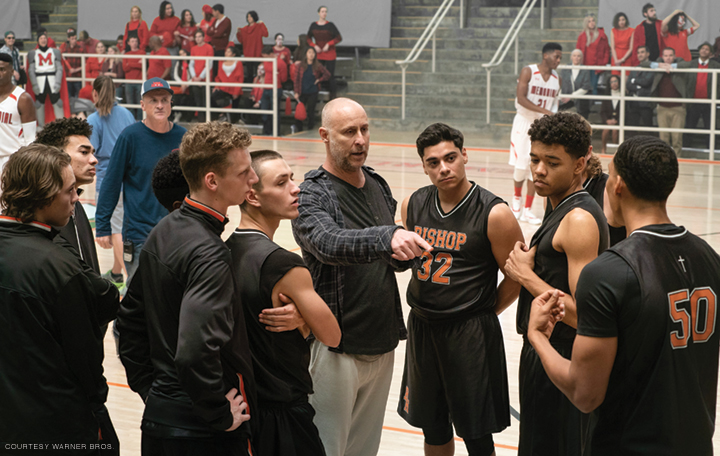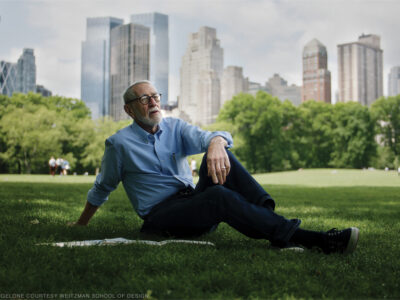
A former Penn football star is probably the best sports movie director working today. It’s a title he doesn’t want.
Rich Comizio W’87’s first meeting with Gavin O’Connor C’86 was a painful one. Lined up on the field goal unit, during a 1984 Penn football preseason practice, O’Connor “ran across the line of scrimmage, stuck his forearm into my shoulder pad, and literally knocked me on my ass backwards, stepped on me, and ran over and blocked the kick,” Comizio says. “That’s how I met Gavin.”
Once they actually got to talking, Comizio quickly learned O’Connor was more than just a “monster” on the football field, where the linebacker helped the Quakers win an Ivy League title every year he was on the team and graduated as the program’s single-season record-holder for sacks with 9.5 in his senior season.
“There was also Gavin the artsy guy,” says Comizio, a football standout in his own right. He remembers being dragged to a play in which O’Connor performed, and getting a dorm room education on Scorsese, Coppola, and other famous directors from his teammate. “I would screen a lot of movies for Rich,” says O’Connor, who also used to head downtown by himself to catch flicks at the Ritz. (The Quiet Earth, a 1985 post-apocalyptic film from New Zealand, stands out as a particular favorite from that time. He also says seeing Rocky a decade earlier was a “huge moment,” because of how it subverted genre clichés by having Sylvester Stallone’s character lose the big fight in the end.)
“The interesting thing about Gavin,” Comizio says, “is he used to tell me very candidly, ‘One day, I’m going to be a film writer or producer.’”
Melding his athletic roots with his passion for film, O’Connor forged ahead with those Hollywood dreams, surging into the mainstream in 2004 when he directed Miracle, based on the true story of the 1980 US men’s hockey team’s stunning Olympic upset of the Soviet Union. He’s since directed two more underdog sports movies—Warrior, a 2011 film (which he also co-wrote) about two brothers colliding at the end of a mixed martials arts tournament and, most recently, The Way Back, which features Ben Affleck as an alcoholic whose road to recovery is charted through a return to his alma mater to coach high school basketball.
Released on March 6, The Way Back suffered at the box office due to COVID-19 fears and restrictions (and was quickly fast tracked to digital streaming once theaters across the nation were shuttered). But, like the other two, it earned positive reviews from critics and viewers, scoring over 80 percent on both counts on the review aggregator website Rotten Tomatoes.
Written by Brad Ingelsby—whose father, Tom, played basketball at Villanova and in the NBA and whose brother, Martin, is a college basketball head coach at the University of Delaware—The Way Back feels, in some ways, like a modern-day Hoosiers, the classic 1986 sports film about small-town Indiana high school basketball. But Ingelsby always wanted to “strike a balance embracing what audiences love about sports movies and also trying to give them something different.” So he sought out O’Connor, who helped add layers of poignant father-son dynamics on top of the hoops scenes. “As soon as I got the script done,” Ingelsby says, “I thought he was the best person to do this, because he gets human emotion and drama and also can nail the sports in a really honest way.”
O’Connor first aimed to achieve that balance with Miracle, rewriting parts of the script after interviewing former players and Team USA head coach Herb Brooks to add more behind-the-scenes intrigue. “It became a Rashomon thing,” O’Connor says. “Everyone had a different perspective on the same event.” He also sought out excellent hockey players who could act, rather than actors who could skate, to recreate Olympic-level hockey.
In preparing for The Way Back, O’Connor was again determined to work with good athletes but had more wiggle room; they couldn’t be too good, after all, since they were part of a struggling high school team. As in Miracle, though, the sports scenes feel like, well, real sports. “For people who didn’t know the game, I wanted to make sure they understood the geography and what everyone was doing,” O’Connor says. “For people who do know the game, I didn’t want to dumb it down.” Ingelsby says it helps that both come from team sports backgrounds. “I think Gavin and I had the ability to sniff something out if it didn’t look right,” the screenwriter says. “Gavin was so passionate about making the kids feel like real players.”
Before he even shot the first scene, O’Connor acted almost like a coach as he ran drills and fostered a sense of camaraderie between the young actors—all while helping Affleck acclimate to coaching mannerisms. “He didn’t know basketball very well,” O’Connor says. “To make that smell authentic was challenging.” What the Hollywood A-lister did know was drinking, having gone into rehab immediately before shooting the movie. “This one was tricky because it was so personal. He was dealing with his own alcoholism,” says O’Connor, who previously directed Affleck in the 2016 action-thriller The Accountant. In a social media post written shortly before the film’s release, Affleck said, “It has been a real pleasure to work alongside Gavin O’Connor again. He’s the type of director who pays attention to every detail and nuance of the performance.”
Affleck’s personal, raw performance came into sharp focus when his character’s tragedy was only first revealed to the audience midway through the movie. For O’Connor, that kind of storytelling structure—along with other aspects that break away from the typical underdog story you might expect from just watching the trailer—is what initially drew him to Ingelsby’s script. “It’s a character study, and that was exciting for me to do something different,” he says. “You know, people keep telling me I made a sports movie. I was never trying to make a sports movie.”
Ingelsby feels the same way, calling it a “drama with a bit of sports in it.” But when asked if O’Connor is the best sports movie director working today, Ingelsby concedes: “I don’t think he would want that title—but my answer is yes.” One website, in its review of The Way Back, even declared in its headline: “The Next Great Sports Movie Director Has Arrived.”
What does O’Connor think of wearing such a crown? “No, absolutely not,” he says. “No. Don’t say it. I don’t want to be.”
What he does want, Ingelsby contends, is to keep making character-driven films with modest budgets, like The Way Back, even though those are hard to get into theaters. “Our movie, without Affleck, there’s no way we get that made,” the screenwriter says. “Even then, it wasn’t necessarily a slam dunk.” O’Connor admits that, in an era dominated by streaming TV shows and big-budget superhero movies, The Way Back almost feels like it belongs to a different time (or comes from an independent studio). But he credits the heavy hitters at Warner Bros. for giving them the money—and largely staying out of the way. “It was a hard 35-day shoot, really running and gunning. But we never got a script note. Basically, it was like, ‘We’ll see you at the premiere.’”
Despite the shifting entertainment landscape, O’Connor still prefers the pace of moviemaking to television (though he did help Ingelsby get off the ground with Mare of Easttown, a forthcoming series for HBO). He’s currently running point on a Warner Bros. action movie in pre-production called Fast, which follows a former special forces commando tapped by the Drug Enforcement Administration to lead a team against drug warlords in Afghanistan. And the former college football star who’s already made a hockey, MMA, and basketball film could find his way back to the gridiron. “To tell you the truth, we have the rights to Lombardi,” he says, of the story behind one of the NFL’s greatest head coaches. The man who doesn’t want to be pigeonholed then adds: “So I may end up doing another [sports movie] if it all works out.” —DZ




